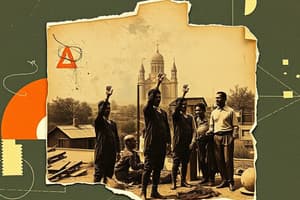Podcast
Questions and Answers
What is the relationship between citizenship and the state according to the text?
What is the relationship between citizenship and the state according to the text?
- Citizenship is a social contract with the state (correct)
- Citizenship is a religious commitment to the state
- Citizenship is a legal agreement with the state
- Citizenship is a financial obligation to the state
What are the usual responsibilities of citizenship mentioned in the text?
What are the usual responsibilities of citizenship mentioned in the text?
- Loyalty, financial contributions, and military service
- Allegiance, taxation, and military service (correct)
- Freedom, equality, and justice
- Worship, charity, and obedience
According to Aristotle, who can be considered a citizen?
According to Aristotle, who can be considered a citizen?
- Anyone who benefits from a state
- Anyone who has power in a state (correct)
- Anyone who follows the laws of a state
- Anyone who pledges allegiance to a state
What is the key aspect of citizenship as per Vattal's definition?
What is the key aspect of citizenship as per Vattal's definition?
Why are full political rights predicated upon citizenship?
Why are full political rights predicated upon citizenship?
What is the legal principle that a person's nationality at birth is determined by the place of birth?
What is the legal principle that a person's nationality at birth is determined by the place of birth?
Who are considered as citizens of the Philippines under the 1987 Constitution Article IV, Section 1?
Who are considered as citizens of the Philippines under the 1987 Constitution Article IV, Section 1?
What is the judicial act of adopting a foreigner and clothing him with the privileges of a native-born citizen called?
What is the judicial act of adopting a foreigner and clothing him with the privileges of a native-born citizen called?
Who are considered as aliens in the Philippines?
Who are considered as aliens in the Philippines?
What do active citizens engage in to promote and sustain democracy?
What do active citizens engage in to promote and sustain democracy?
Flashcards are hidden until you start studying
Study Notes
Citizenship and the State
- Citizenship is closely tied to the state, as it grants individuals a sense of belonging and identity within a particular nation.
- The state, in turn, confers rights and responsibilities upon its citizens.
Responsibilities of Citizenship
- The usual responsibilities of citizenship include loyalty, paying taxes, and military service.
- Citizens are also expected to participate in the democratic process by voting, engaging in civic activities, and respecting the rule of law.
Aristotle's Definition of Citizenship
- According to Aristotle, a citizen is someone who shares in the governance of the state and participates in the administration of justice.
Vattel's Definition of Citizenship
- Vattel defines citizenship as the possession of civil rights, with the key aspect being the right to participate in the government.
Full Political Rights and Citizenship
- Full political rights are predicated upon citizenship because it is the basis of an individual's membership in the political community.
Jus Soli Principle
- The legal principle that a person's nationality at birth is determined by the place of birth is known as jus soli.
Citizenship in the Philippines
- Under the 1987 Constitution Article IV, Section 1, citizens of the Philippines are those who are born to a Filipino mother or father, or those who are naturalized in accordance with the law.
Naturalization
- The judicial act of adopting a foreigner and clothing him with the privileges of a native-born citizen is called naturalization.
Aliens in the Philippines
- Aliens in the Philippines are those who are not citizens of the country.
Active Citizenship
- Active citizens engage in various activities to promote and sustain democracy, such as participating in civic organizations, advocating for policy changes, and holding elected officials accountable.
Studying That Suits You
Use AI to generate personalized quizzes and flashcards to suit your learning preferences.




